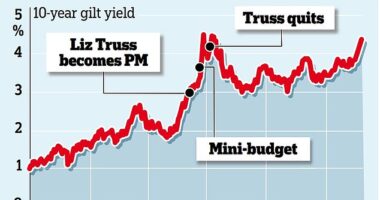
Many Britons could be at risk of paying over the odds on their house purchases, with 30 per cent of homeowners saying they did not negotiate at all on the price of their current property.
A huge stumbling block for many was their lack of knowledge, with more than one in five confessing that they didn’t know how to negotiate according to research by Barclays.
It also revealed that homeowners aged between 25 and 34 experienced the most anxiety and stress when trying to haggle down the price of their home, compared to those aged 65-plus who said they were much more comfortable with the process.


UK home buyers often feel too embarrassed to negotiate on price, according to Barclays
Fear of losing the property, impatience with the buying process and embarrassment over negotiating were all cited as common reasons why home buyers refrained from haggling.
Some admitted they had found the thought of negotiating to be intimidating or scary, whilst others were concerned about upsetting the seller.
‘Our research has found that a considerable number of Britons lack the skills or confidence needed to negotiate successfully on the price of their home,’ said Rob Smith, head of behavioural science at Barclays.
‘We are more likely to negotiate on a used car than we are on a property, highlighting the unique emotional nature of one of the biggest purchases people make in their lifetime.
‘Understandably, the process can feel daunting – particularly if you fear losing out on your dream home. But a successful negotiation can result in extra money to bolster your family finances or invest back into your home.’
How you can get negotiation-ready
1. First and foremost, do your research to determine how the property compares to similar homes for sale in the area.
‘I advise looking at a number of properties before offering,’ says Nigel Bishop, a property search consultant at Recoco. ‘The more properties you see in a given area, the better sense you’ll get of what you should be paying.’
It is also possible to get a sense of current prices in the area by looking online.
‘Look on the online portals such as Rightmove or Zoopla, and look at sold prices over the past two years within the postcode you are looking to buy in. This will give you a greater feel for what the price should be,’ says Bishop.
2. Don’t be afraid to ask the seller’s estate agent prying questions about how long the property has been on the market, why the vendor is selling and whether they already have their next home secured.
‘Ask the estate agent what the sellers’ motivations are and try and make your offer accommodate them,’ says buying agent Henry Pryor.
‘Find out whether the seller needs a quick sale, and if they have had any other interest or offers.
‘If there have been other offers, find out whether these were unacceptable because the buyer wasn’t able to proceed, or because they just didn’t offer enough.


Finding out what other local properties are selling for is a good starting point for negotiations
‘Agents will often say, “We have had two offers that have been turned down” – but won’t tell you what the reason was unless asked.’
3. If you want to negotiate, it is important to ensure you are in a position where you can actually proceed with a purchase.
‘Make sure you either have already agreed the sale of your own property, or that you have a mortgage agreement in principle,’ says Bishop.
‘The key to any property negotiation is to prove you can proceed and, if you can’t, I would suggest you hang back from any property until you can.’
4. Decide what the maximum is that you are prepared to pay and don’t allow yourself to be bullied by the estate agent.
‘Even if you won the lottery last weekend, the fact that you can afford to pay more doesn’t mean that you have to,’ says Pryor.
‘The estate agent’s job is to pick your pocket until you say no, so the sooner you tell them that this is your limit, the quicker they will turn on the seller and force them to come down to your level.’
5. It can be unwise to insult the seller with an outrageously cheeky offer, so it is best to be realistic when offering under the asking price.
‘Typically, about 10-15 per cent under the asking price is an acceptable place to start,’ says Bishop, ‘but there is a danger of offering too low.
‘If you insult the seller with a very low offer, you mind find they lose their trust in you as a credible buyer.’
‘You can also alienate the estate agents because, in the future, when you ask to look at another property, they will see you coming and be less responsive or helpful.’
6. Remember, you can re-negotiate until the exchange of contracts.
‘Because of the way we sell homes in England, you can actually re-negotiate or withdraw at any time without penalty before you have exchanged contracts,’ says Pryor.
‘But it is always better to have done all your homework before you get into paying costs or making a legal commitment.’


If any structural issues are picked up in the survey, this might give you a reason to re-negotiate
A common reason why you might want to re-negotiate after having an initial offer accepted is if the building survey throws up costly maintenance issues.
Bishop adds: ‘If a surveyor comes back and says you will need a new roof in 10 years, then get a quote and re-negotiate.’
7. Finally, don’t get too carried away by the negotiation itself and remember this is about you, your home and your life.
‘Negotiation is a psychological game and some people want to feel like they have won,’ says Bishop.
‘There are some vendors who, no matter what you offer, will want more: so just have the maximum figure in mind that you’re prepared to offer, and don’t allow yourself to get carried away.’










